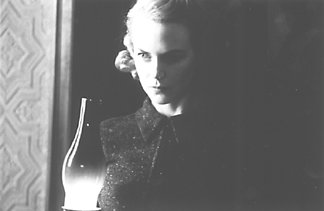Gothic Reversals
Spanish Director Alejandro Amenabar Reinvents the Occult Thriller
By Cole Smithey

Nicole Kidman searching for what goes bump in the night.
The Others is the first authentic gothic horror film to come along since Roman Polanski's mind bending puzzle The Tenant (1976). Set inside a fog shrouded Victorian mansion on the island of Jersey (14 miles off the coast of Normandy) during the last days of World War II, the movie sustains a pitch of fear and suspense that tightens like a damp noose around the neck of its audience. It's a film that urges repeated viewing because of its loving embrace of psychological terror inside the dark and lonely confines of a mansion with some undesirable intruders. Nicole Kidman is brilliant as Grace, an icy mother of two children who suffer from a disease that prevents them from coming into contact with any light stronger than candlelight. Things get wonderfully creepy when the three servants Grace has hired to take care of the house become increasingly involved with things that go bump in the dark. For anyone who thought The Sixth Sense was clever and scary, writer/director Alejandro Amenabar's The Others makes that film's winking conceits seem like amateur hour.
Alejandro Amenabar has an ear for the chilling tones of children's voices when they recite prayers, and the confining ability of shadows to make one a prisoner of space and mood. There isn't a single bloody special effect in The Others to give graphic release from the obsessive tone of the story. The movie builds instead on the cumulative significance of Nicole Kidman's glacial darting stare and impeccably coifed hair while proof of ghostly intruders is dreadfully revealed. Every element of costume, music, lighting, camera angle and dialogue meticulously supports the paranoia that wells up in Grace's devout Christian mentality. Grace cannot, and will not, fathom an earthly world made by God where the living and the dead brush against one another. Her self-deception is at once her strength and her greatest weakness. The story is a mother's supernatural journey in which the unknown is revealed as frighteningly familiar.
The movie opens with a shout. Grace awakens from a nightmare, screaming a blood-curdling shriek which casts a spell over the film that is not broken even after the final credits have rolled. Grace is soon snapped into reality by a knock at her front door by a trio of servants who promise to be "honest and hardworking." It seems that the previous servants abandoned their jobs a few weeks prior without explanation or taking their final pay. Mrs. Mills (Fionnula Flanagan) is a disarmingly sympathetic Irish cook and nanny who ushers Lydia (Elaine Cassidy of Felicia's Journey), a young mute servant and Mr. Tuttle (Eric Sykes), a jovial gardener, into the command of Grace's strict house rules.
Grace preaches to her new staff about the way each door in the 55 room house must be locked at all times as she compensates for her children's photosensitive disorder by pulling every curtain closed in the house while leading the house tour. Grace explains how the Nazis cut off power to the house so often that she became accustomed to living without electricity and gave up on restoring it. Silence, we learn, is of preeminent importance to Grace.
When Grace introduces her unconventional children to Mrs. Mills from their light protected bedroom, it's a jarring event because her definition of motherhood seems so clearly skewed by a repressive agenda. Grace is a tightly wound porcelain specimen of Victorian matronly values who repeatedly punishes her children for confirming the existence of intruders in the house. She home-schools nine year-old Anne (Alakina Mann) and six year-old Nicholas (James Bentley) with an iron resolve to give them a sound foundation in ethics and religion by way of fear and discipline. It's revealed that Grace's husband, Charles (Christopher Eccleston), has gone to war and is not likely to return.
Anne is a particularly problematic child who constantly taunts Nicholas with stories about a family of ghosts whom she sees moving about the house. There are compound levels of implied accusations in the story against Anne, Mrs. Mills and the probable ghosts themselves that keeps the audience in a state of suspended curiosity and anxiety. As the mystery unfolds of whom or what is behind the strange sounds and occurrences, Amenabar spikes his dry cocktail of horror with moments of deft humor that give the movie an enjoyable lilt of satisfaction.
By wrapping his story in a time warping mystery, Amenabar modulates the template for occult thrillers and presents a film built on layers of half-glimpsed clues and ideas. As the audience is brought to wrangle with doubt and suspicion through the eyes of little Anne and Nicholas, the movie performs a perfect illusion of transposing protagonists. If the luminous figures that haunt Grace's grand mansion are to be reconciled with, it naturally must transpire through the children. But where madness finds favor in The Others is in the damning effect that innocence plays. It's a roller-coaster cinematic game that you will want to play again and again.